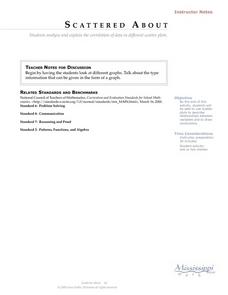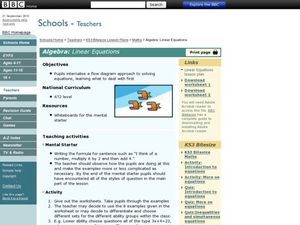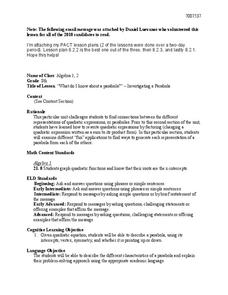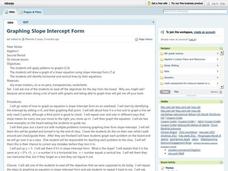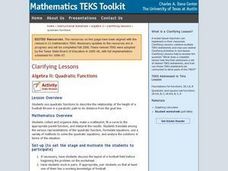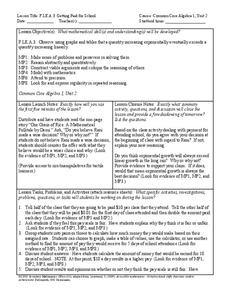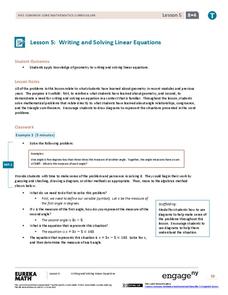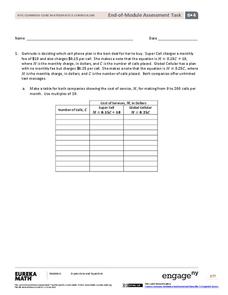Curated OER
Investigation - Looking For Triangles
Seventh graders investigate a series of triangles, looking for patterns and generalizing what they have found. They analyze the pattern data and organize it into a table and graph. Students identify the relationship and discover the rule...
Curated OER
Worksheet 8 - Limit of Slopes
In this limit of slopes worksheet, students compute the limit of slopes, find the slope of the secant line, and determine the slope of the tangent line. This one-page worksheet contains five multi-step problems.
Curated OER
Zero Product Property and Quadratics
In this quadratic activity, algebra learners use the zero product property to solve basic quadratic equations. They identify where the parabola crosses the x-axis. Explanations and examples are provided. Answers are located on page two....
Illustrative Mathematics
Growing Coffee
Ask your algebra learners to write an equation that has unit constraints. This commentary talks about the constraints, but does not show them in the equation. It is important that your mathematicians understand that the units apply to...
Curated OER
Scattered About
Students are introduced to the concept of scatter plots after reviewing the various types of graphs. In groups, they analyze the type of information one can receive from a scatter plot and identify the relationship between the x and y...
Curated OER
Worksheet 7 - Asymptote
In this asymptote worksheet, students compute limits, graph vertical asymptotes, and find the slope of the secant line. This one-page worksheet contains six multi-step worksheets.
Curated OER
Discovering Math: Computation
Middle schoolers add, subtract, multiply, and divide rational numbers. They find the square and the cube of numbers. They create a game incorporating computation on rational numbers. Everyone works together to write and evaluate...
Curated OER
Percentages in Word Problems
Eighth graders, after brainstorming all the places they see percentages in every day life (sales, basketball, grades, etc.), calculate percentages from bases and parts in word problems. They review their notes together on percentage...
Curated OER
Barter and Trade
Young scholars explore the concepts of bartering and trading. In this algebra lesson, students barter with each other for different items. They use special cards to designate ownership of an item as they explore the complexity of bartering.
Beacon Learning Center
Angles and Algebra
Students calculate angle measure for triangles and complementary/supplementary angles. After a lecture/demo, students utilize a worksheet imbedded in this plan to gain practice.
Curated OER
Algebra: Linear Equations
Young scholars investigate the mathematical concept of linear equations. They use codes to lead the discussion. The teacher makes clarification as necessary during the class discussion. The instructional activity includes dialogue to be...
Curated OER
Investigating Parabolas
Students identify properties of parabolas. In this algebra instructional activity, students factor quadratic equations and identify the properties of parabolas. They find the roots, vertex and intercepts of a parabola.
Curated OER
Introductory Algebra Chapter 7 Review
In this math worksheet, students solve the problems based upon finding the slope of the linear equation lines. Each problem set has a detailed example.
Curated OER
Algebra: Linear Equations
Young scholars draw graphs of linear equations using the slope intercept form. Upon completion of various problems, students record their answers on the board and explain the solutions to classmates. Young scholars take a test over...
Curated OER
Mathematics Within: Algebraic Patterns
Students investigate the concept of using proportions to compare quantities while also practicing calculations for foreign exchange rates. They develop the skill of solving for unknown quantities of money while using an algebraic equation.
Curated OER
Introductory Algebra Chapter 3 Review
In this math worksheet, students find the solutions to the problems while interpreting the line, bar, and circle graphs. The examples are given to help in the context of each objective.
Curated OER
Algebra II: Exponential Functions
Students investigate, describe, and predict the effects of parameter changes on the graphs of exponential functions; describe limitations on the domains and ranges of these functions; and examine asymptotic behavior.
Curated OER
Exponents - Week 1
In this exponent worksheet, students add, subtract, multiply and divide exponents. They solve problems containing negative exponents, fractional exponents, and polynomials. This two-page worksheet contains eight problems.
Curated OER
Algebra II: Quadratic Functions
Students collect and organize data, make a scatterplot, fit a curve to the appropriate parent function, and interpret the results. Students translate among the various representations of the quadratic function, formulate equations, use a...
Howard County Schools
Getting Paid for School
What if you were paid to attend class? What kind of payment schedule would you choose? Learn how exponential functions will eventually exceed linear functions by comparing two different payment schedules for attending class.
EngageNY
Population Problems
Find the percent of the population that meets the criteria. The 17th segment of a 20-part unit presents problems that involve percents of a population. Pupils use tape diagrams to create equations to find the percents of subgroups...
EngageNY
Writing and Solving Linear Equations
Incorporate geometry into the solving linear equations lesson. Pupils use their knowledge of geometry to write linear equations which reinforces geometry measurement concepts while at the same time providing a familiar context for...
EngageNY
Writing Division Expressions II
Division is division is division is division ... four different ways to write division. Scholars continue to learn about division expressions. They translate between several forms, including verbal phrases, expressions using the division...
EngageNY
End-of-Module Assessment Task: Grade 6 Math Module 4
Finish out the module with a bang. The last installment of a 36-part module is an end-of-module assessment task. Test takers set up equations to represent relationships and solve problems in an assortment of contexts.






